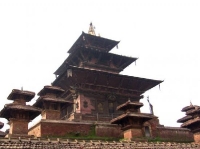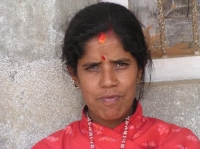Disease of the heart and the cardiovascular system are divided into five categories, with the characters of Vata, Pitta, Kapha, Sannipata and Krimija. A general rule is that heart disease is often caused by pathogenic defects of the serum. These defects must be corrected, typically, by using measues such as restricting the intake of heavy and greasy foods, and by prescribing regular exercise as well as digestive or heart-specific rasayanas. Additional factors in disease of the heart include the regular intake of foods that are difficult to digest, anxiousness and worrying, and the suppression of natural urges. As a general rule, heart diseases are very difficult to cure. When treating heart disease of all types, pure clean air is essential to have the best results.
General Treatment of Heart Disease
 Ayurveda describes several individual heart restoratives that can be used to protect the heart, or to strengthen a weak heart. These include Shatavari root (wild asparagus / Asparagus racemosus), Kasturi (deer musk / Moschus moschiferus), Arjuna bark (Terminalia arjuna), Hiraka Bhasma (purified diamond oxide) and Badari fruit (jujube, sour variety / Zizyphus jujube). Many sour fruits have cardio-restorative properties, including pomegranate, half-ripe mango, rhubarb, citron, jujube, and orange.
Ayurveda describes several individual heart restoratives that can be used to protect the heart, or to strengthen a weak heart. These include Shatavari root (wild asparagus / Asparagus racemosus), Kasturi (deer musk / Moschus moschiferus), Arjuna bark (Terminalia arjuna), Hiraka Bhasma (purified diamond oxide) and Badari fruit (jujube, sour variety / Zizyphus jujube). Many sour fruits have cardio-restorative properties, including pomegranate, half-ripe mango, rhubarb, citron, jujube, and orange.
The standard compound Dadimadi churna given with ghrita (ghee / clarified butter) can be used to strengthen the heart, given in doses of 1-2 grams. This compound is stronger if prescribed with 200 mg of Shringaputa (deer horn ash / Cervus nippon) and 100 mg of Rasasindura (red crystal of mercury sulphide). If there is complete heart failure, then it is necessary to use medicines that create heat, energy and dryness, such as Mrigamadasava, 10 drops given with warm water. To relieve heart attack with strong palpitations herbs such as Nagaram rhizome (Indian cyperus / Cyperus pertenuis) can be used, 1-2 grams boiled in milk.
Vataja Heart Disease (Angina Pectoris)
Vataja heart disease is generally correlated with angina pectoris, manifesting as a shooting pain radiating to the arms, shoulders and neck, accompanied by sweating. Such symptoms occur as the result of the aggravated function of the cardiac nervous system, and are treated with regular Vata treatments and diet, along with general heart remedies, and specific remedies against angina pectoris. In addition to the use of the regular Vata treatments, a decoction made of digestive remedies such as Sunthi root (dry ginger / Zingiber officinalis) is prescribed to relieve sharp pain sensations in the heart. Some specific remedies against angina pectoris are:
- Shringaputa (deer horn ash / Cervus nippon), 200 mg with ghrita (ghee/ clarified butter)
- Baladyam ghritam, 1-2 grams
- Arjuna bark (Terminalia arjuna), 500 mg with honey or milk
- Bala plant (country mallow / Sida cordifolia), 500 mg with honey or milk
- Arjuna ghritam, 1-2 grams
 Hricchulam (Pseudoangina / Angina pectoris vasomotoria)
Hricchulam (Pseudoangina / Angina pectoris vasomotoria)
Hricchulam is a kind of pseudoangina that is concerned with the presence of air bubbles in the serum of the heart that cause aggravation of the cardiac nervous system. It is treated with the same remedies used for angina pectoris.
Hriddrava (Tachycardia)
Hriddrava corresponds with tachycardia, and is concerned with a deficiency of the blood (either serum or the blood sugar) that causes the aggravation of the cardiac nervous system. It is treated with the normal Vata treatments and diet, along with the same remedies used for angina pectoris (above) and the herbal remedies against anemia. If the tachycardia is caused by toxicity, infection, or other cause, the cause must be treated. One particularly useful remedy for Hriddrava is Vatakulantaka rasa, in doses of 125-250 mg.
Pittaja Heart Disease (Myocarditis / Pericarditis)
Pittaja disease of the heart can be correlated with myocarditis and pericarditis, manifesting as a sharp burning pain that radiates to the chest and throat, mimicking the pain of gastritis. Pittaja heart disease concerns the aggravated function of the cardiac vein system, and is treated with the regular Pitta treatments and diet, along with laxative remedies and specific remedies, including:
- Arjuna bark (Terminalia arjuna), 500 mg with honey or milk
- Panchamulam (five roots compound), 1000 mg with water
- Bala plant (country mallow / Sida cordifolia), 500 mg with honey or milk
- Madhukam root (licorice / Glycyrrhiza glabra), 500 mg boiled in milk
- Baladyam ghritam, 1-2 grams
- Arjuna ghritam, 1-2 grams
Kaphaja Heart Disease (Cardiac hypertrophy)
Kaphaja disease of the heart concerns the aggravated function of the cardiac artery system that causes heaviness or an increased in the size (hypertrophy) of the heart. Common symptoms include a heavy, dull pain, an increase in chest pressure, difficult respiration and sweating. It is treated with the basic Kapha treatment and diet along with emetic remedies and specific remedies against hypertrophy, including:
- Shilajita is a specific medicine against hypertrophy of the heart. Dose is 2 pills twice daily.
- Vatakulantaka rasa, 2-3 pills twice daily.
Additional headings in this chapter*
Hritshulam (Heart Attack / Myocardial Infarction)
Hridayopalepa (Thrombosis)
Shiragata Roga (Varicose Veins)
Sannipataja Heart Disease
Krimija Heart Disease
Pittavrita (Hypertension)
*To acquire the complete contents of “Ayurveda In Nepal: The Bajracharya Samhita” please click here.
0 Responses to “Diseases of the Heart”